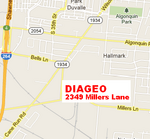
She states that city authorities can fine the firm up to $10,000/violation for each day that it occurs or continues.
“The district will assess a civil penalty for this violation after meeting with the company and coming to an agreement as to corrective measures required,” Anderson wrote last Friday.
She added: “If your company is not in compliance now, it must effect compliance by October 5 2012…It will be necessary to incorporate a compliance plan and any penalty into an order adopted by our board.”
Residents claim breathing difficulties
An attached incident investigation report states that the district received numerous odor complaints from May 13 2011 to May 8 2012, on the part of residents living near Diageo’s whiskey ageing warehouse at 2349 Millers Lane, Louisville.
Residents commonly reported “objectionable sour alcohol odors and odors similar to vinegar”, Anderson states, adding that APCD compliance officers also smelt the odor for 30+ minutes.
“The odor is reported to cause nose and throat irritation, and in some cases, difficulty breathing. Residents complained that they cannot enjoy being outdoors, and are driven indoors when the odor is present, which can occur on a daily basis,” she wrote.
A Diageo spokeswoman told this publication: “We are a longstanding member of the community and take these allegations very seriously. We have requested the incident reports related to the APCD notice and will review them closely.
"As we have stated previously, the appearance of a black substance on some buildings and structures is due to a naturally occurring common mold that is found widely in the environment, including areas not related to whiskey production," she added.
Fungus thrives in ethanol-rich surrounds
A separate report released by Louisville APCD on September 4 lists resident complaints relating to strong odors and a sooty ‘whiskey fungus’ on properties near whiskey warehouses (Brown-Forman and Heaven Hill also have Louisville sites), which was irremovable and had damaged property.
Report author Hannah Byland, environmental specialist at the APCD, wrote that the body’s analyses showed that the black soot (Baudoinia Compniacensis) and odors were the result of emissions from the city’s whiskey warehouses.
The fungus thrived in ethanol-rich environments, and at least 2% of whiskey per barrel (the ‘angel’s share’) evaporated during whiskey ageing, she added.
Ethanol-related discontent has mounted in Louisville in recent months, and city residents filed a class action on May 30 against Diageo, Brown-Forman and Heaven Hill, alleging variously: negligence, trespass, nuisance, strict liability and the right to injunctive relief.





